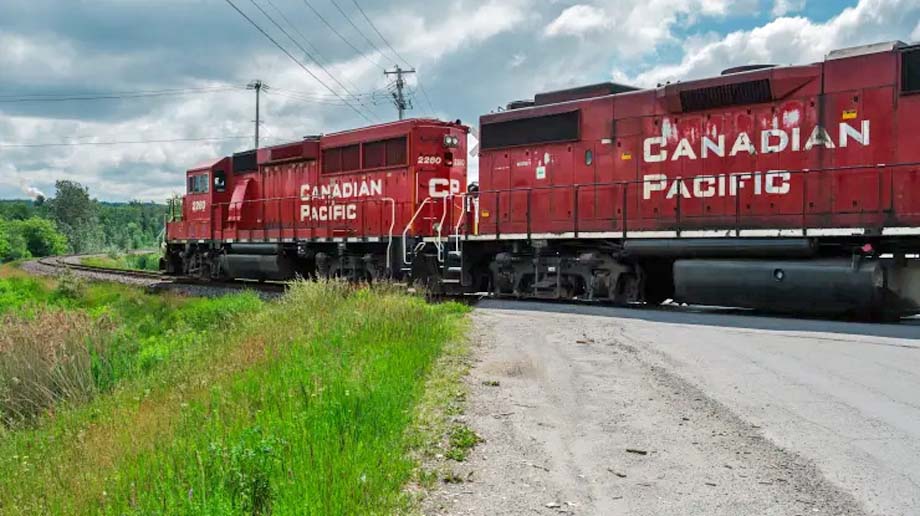
Englewood Cliffs New Jersey USA
North America - Rail traffic from Canada into the U.S. had a third-straight weekly drop as a result
of the on-again, off-again, strike at West Coast Canadian ports.
The vessel and container gridlock is raising concerns for chemical companies who have critical materials stuck as a
result, creating supply chain issues.
Last week, total rail volume from Canada to the U.S. was down 12 percent, according to The Association of American
Railroad's latest rail traffic report for the week ending 22 Jul 2023.
This was an improvement given the first full week of the strike saw a 46 percent decrease in rail trade from Canada,
and the second week suffered a 36 percent decrease.
There are currently nine containerships waiting at the Port of Vancouver and the average wait time to get into port is
7.8 days, according to Marine Traffic data.
At the Port of Prince Rupert, six container vessels are anchored, and the average wait to get into port is 8.9
days.
The Railway Association of Canada originally estimated that it would take three to five days for every day the strike
lasted for networks and supply chains to recover.
When the first strike ended on its thirteenth day, delays for rail containers were estimated at 39 to 66
days.
Adding another day with the on-again, off-again, strike last week, brings the congestion removal tally up to 42-70
days.
"Delays appear to be bearing out toward the mid-to-upper end of that range," a Railway Association of Canada
spokesperson wrote in an email to CNBC.
Chemicals Supply is a Top Concern
The National Association of Chemical Distributors (NACD) told CNBC that companies in its membership are also hearing
that rail delays are expected at the higher end of the range.
During CN's earnings call on 26 Jul 2023, Doug Macdonald, executive vice-president and chief marketing officer, said
that CN initiated a recovery plan on 14 Jul 2023.
"We are running additional trains out of Vancouver and Rupert to clear the backlog and expect it to take up to
eight weeks to be current if all areas of the supply chain work together."
All of these delays are impacting the delivery of critical chemical goods and items that are being delivered at the
start of peak shipping season.
Chemical Solvents, an Ohio-based company, is one of the American shippers that uses the Port of Vancouver for its Asian
imports.
The company had previously moved imports out of the Port of Long Beach amid fears over the past year of a
longshoreman's strike on the U.S. West Coast, and Covid rail delays.
The company imports products used in paints, coatings, and cleaning agents.
Blaine Davidson, vice president of sales at Chemical Solvents, said significant delays are "going to be a
problem," with existing supply of key chemicals limited in the supply chain.
Terri Shimensky, vice president of procurement for Chemical Solvents, said that the company was able in one case to
buy a key chemical in the U.S., it was at a 15 percent markup.
"Our margins are thin and that extra 15 percent means we actually lost money in the transaction," Shimensky
said.
Eric Byer, CEO of NACD, said that hundreds of chemicals are needed to complete the U.S. manufacturing of products that
arrive through the West Coast Canadian ports.
"There are millions of dollars of chemicals stranded on the water. We have members waiting for chemicals to be
unloaded in Vancouver and then railed down to Chicago," Byer said.
That includes chemicals like sulfuric acid, which is used in drain cleaning products like Drano, phosphates used in
laundry detergent, and acetone, which is used in the nail industry, as well as a solvent that breaks down grease and
wax.
Sodium fluoride, found in toothpaste, and sodium bicarbonate, also known as baking soda, also come through the West
Coast ports of Canada.
Additional chemicals transported to the U.S. go into food, power drinks, cleaning, water purification, and personal
care products.
Railroads also move large amounts of anhydrous ammonia, potassium compounds, and urea, as well as millions of tons of
raw materials used to produce fertilizer.
"We remain concerned that, while waiting for ILWU Canada members to ratify the agreement struck with the BCMEA,
shifts are being missed, and the product is still on the water for weeks after arriving at the Port of Vancouver. The
current situation means that sooner or later product will not arrive on time, causing the needs of customers to not be
met, and the consumer either being unable to secure the product they need, or facing difficulties affording them due to
increased costs," Byer said.
NACD said some chemical companies expect supply chain congestion to last until September or October.
According to the Association of American Railroads, a single rail tank car of anhydrous ammonia is the equivalent of
approximately four tanker trucks and enough to fertilize 770 acres of corn.
World of Trade in Turmoil
The strike has left logistics managers and the world of trade in turmoil as they attempt to assess the situation and
make decisions about changing ports.
Paul Brashier, vice president of drayage for ITS Logistics, said his client's containers were finally unloaded a month
late.
"We tracked the vessel which was at anchor at the start of the strike to have it go to Seattle and drop off U.S.
bound containers. Finally the vessel went back only to wait again with the on-again, off-again, strike. Now my client
sits and waits," Brashier said.
According to eeSea, there were three new vessel port diversions and one new port change, bringing the total to
seventeen port swaps and thirteen diversions since the start of the strike on 1 Jul 2023.
As a result, $12 bilion in freight was stranded on the water.
ILWU West Coast Canadian Chapter members are expected to vote on a tentative agreement on Thursday and
Friday.
There is no timeline on the announcement of the vote results, according to the union.
The terms of the deal include a four-year package with a compounded 19.2 percent wage increase over the four years,
which would result in the median ILWU income moving from $136,000 to $162,000, not including benefits and pension,
according to the British Columbia Maritime Employers Association, which represents port ownership.
It disclosed that the proposed deal also provides an 18.5 percent increase in retirement lump sum payment in addition
to pensions, increased tool allowances, benefits, and pension contributions.
Lori Ann LaRocco.
(likely no image with original article)
(usually because it's been seen before)
provisions in Section 29 of the
Canadian Copyright Modernization Act.
